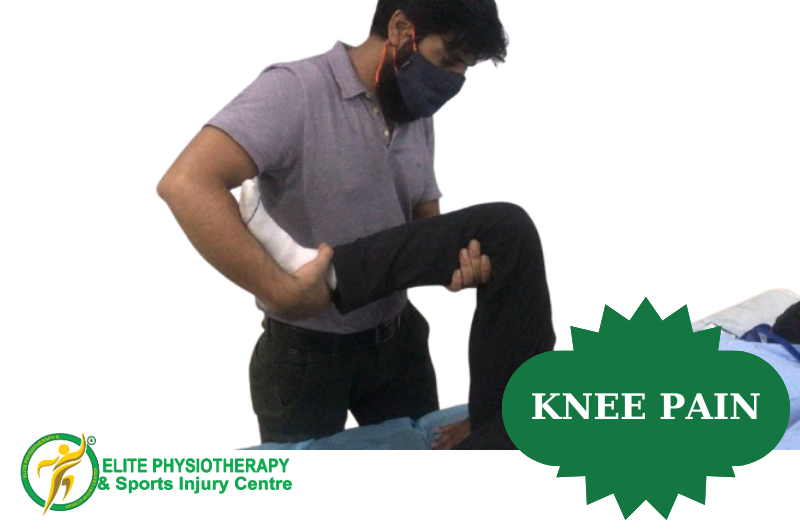
Knee Pain
At Elite Physiotherapy and Sports Injury Centre, we treat people with knee pain on a regular basis. Knee pain can significantly affect your everyday activities, regardless of whether you’re an athlete or just have an active lifestyle. Whether it’s from an injury, overuse, or chronic condition, knee pain can make it difficult for you to maintain an active and healthy lifestyle. We provide professional diagnosis and treatment at Elite Physiotherapy and Sports Injury Centre to aid in your recovery and return of your strength. If you’re experiencing knee pain, don’t wait—reach out to us today for a comprehensive assessment.
Questions
What are the most common symptoms of knee pain?
Depending on the source, knee pain symptoms might vary, but frequent indications include:
1. A acute or aching pain that might happen when resting, walking, running, or even bending the knee.
2. Stiffness or swelling: The knee may seem puffed, bloated, and rigid, which will reduce your range of motion.
3. Weakness or instability: Some people may have feelings of instability, buckling, or an inability to sustain their body weight on their knee.
4. Popping or crunching sounds: These noises, which are frequently indicative of ligament strain or cartilage injury, can be heard during movement.
5. Redness and warmth: An infection or irritation may be indicated by the skin surrounding the knee being warm to the touch due to inflammation.What are the common causes of knee pain?
A number of conditions can result in knee pain, including:
1. Ligament injuries, such as rips to the ACL
2. Tears in the meniscus
3. Runner's knee, or patellofemoral pain syndrome
4. Inflammation of the tendons, or tendinitis
5. Arthritis (such as rheumatoid arthritis or osteoarthritis)
6. Bursitis, or inflammation of the knee's fluid sacsHow can I tell if my knee pain is due to an injury?
Your knee pain is probably tied to an injury if it started after a particular event, such a fall, an abrupt twist, or a direct hit while playing sports. Typical indications of knee damage include:
1. Sharp, unexpected pain
2. Swelling that appears suddenly
3. Unable to support weight on the knee Deformity that is visible
4. A feeling of instability or bucklingIt's critical to get emergency attention at a facility like Elite Physiotherapy if you encounter any of these symptoms in order to receive an accurate diagnosis and a recommended course of treatment.
My knee feels stiff and swollen after exercise. Is this normal?
After engaging in vigorous physical exercise, occasional stiffness and moderate swelling are common, particularly if you've pushed your body past its typical limitations. But persistent stiffness and swelling, especially if they are accompanied by discomfort, might point to an underlying condition or overuse damage like:
1. Tendon inflammation
2. Knee pain in runners
3. Bursitis
4. first stages of osteoarthritisSee a physiotherapist for an evaluation if you have ongoing swelling or pain following activity.
Should I be concerned if I hear popping sounds in my knee?
Crepitus, or popping or crunching sounds in the knee, can be benign, particularly if there is no accompanying pain. But if there's also pain, swelling, or instability along with the popping, this might indicate:
Meniscus tear
Cartilage damage
Ligament issues
In these cases, it’s best to schedule a consultation to prevent further complications.Can knee pain be a sign of arthritis?
Indeed, knee pain may indicate arthritis early on, especially if it coexists with:
1. stiffness in the morning
2. Ache that becomes worse after exercising
3. Swelling
4. Reduced mobilityAlthough osteoarthritis is more frequent in adults, it can sometimes occur in younger people, particularly in sports, as a result of overuse or prior injuries.
How is knee pain diagnosed at Elite Physiotherapy and Sports Injury Centre?
At our facility, we diagnose knee pain using a detailed and individualized method. This procedure consists of:
1. A thorough medical history and physical examination to evaluate joint stability, range of motion, and symptoms.
2. Use imaging studies, including MRIs, ultrasounds, or X-rays, to find any hidden cartilage, ligament, or tendon damage.
3. Functional mobility evaluations are a useful tool for customizing treatment by analyzing how the knee functions during different activities.When should I seek professional help for knee pain?
You ought to get medical attention if you encounter any of the following:
1. More than a couple days of pain
2. Notable edema
3. Unable to bend or straighten the knee to its maximum extent
4. Intolerance or trouble sustaining weight
5. Pain that becomes worse with time
6. Any symptoms of infection, including fever, warmth, or rednessKnee pain, whether from chronic problems or sports injuries, is our specialty at Elite Physiotherapy and Sports Injury Centre. Our aim is to return you as soon and securely as possible to your busy lifestyle.
Can knee pain be treated without surgery?
Of course! Many cases of knee pain can be successfully treated without surgery, particularly those involving soft tissue injuries or early-stage arthritis. Examples of these therapies include:
1. Physiotherapy to increase flexibility and build muscle
2. Manual treatment to facilitate joint mobility
3. Using heat and ice to treat inflammation
4. Taping or bracing to provide support
5. Modification of activities to avoid additional strainTogether, you and our staff at Elite Physiotherapy will create a personalized treatment plan that is suited to your individual requirements.
